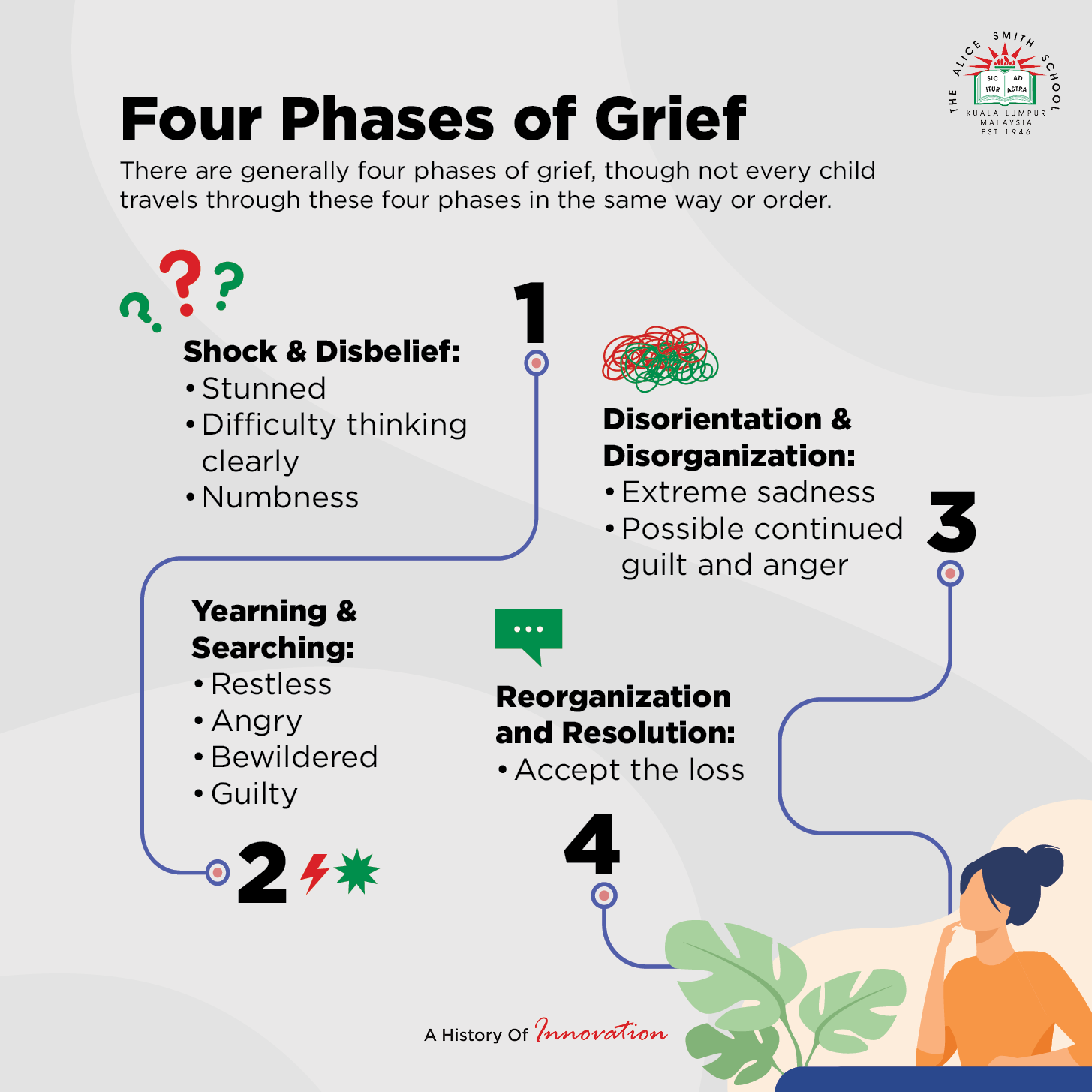Children can have quite different experiences when someone they know dies. They feel and show grief in different ways, particularly in the case of sudden or unexpected death or loss. It is important to understand as a parent that there is no one ‘right’ way for them to respond to a loss. This means that feelings and behaviours will vary across children and can change throughout the bereavement process. Whether a child feels all, few or none of the key associated emotions can be dependent on the type of relationship they had with the person who has died and the support they receive. Having face-to-face support is often a vital component in helping children to understand, process and, in time, to heal from what has happened. Children will often reach out to family or friends for support and lean on those who care about them.
The four phases of grief
There are generally four phases of grief, though not every child travels through these four phases in the same way or order.
- Shock and disbelief: stunned, difficulty thinking clearly, numbness
- Yearning and searching: restless, angry, guilty, bewildered
- Disorientation and disorganization: extreme sadness, possible continued guilt and anger
- Reorganization and resolution: accept the loss
Grief is personal. There is no right or wrong way to grieve. How people grieve can be influenced by their developmental level, cultural traditions, religious beliefs, mental health, disabilities, family, personal characteristics, and previous experiences.
What to expect
Grief is often characterized by sadness, emotional pain, and introspection in adults. However, children’s grief reactions differ according to age and developmental level:
- Preschool: regressive behaviors, decreased verbalization, increased anxiety
- Primary: decreased academic performance, attention/concentration and attendance; irritability, aggression, and disruptive behaviors; somatic complaints; sleep/eating disturbances; social withdrawal; guilt, depression, and anxiety; repeated re-telling of the event
- Secondary: decreased academic performance, attention/concentration, and attendance; avoidance, withdrawal, high risk behaviors or substance abuse, difficulty with peer relations, nightmares, flashbacks, emotional numbing or depression.
Grieving does not have a timeline. Anniversaries, birthdays, developmental milestones, and other factors could affect students months or years after the loss. Grieving involves meeting specific milestones. Individuals are likely to experience (and often re-experience) some or all of the following adjustments/responses:
- Accepting the death
- Experiencing the feelings and emotional pain associated with death and separation from the deceased
- Adjusting to changes and an altered environment that no longer includes the deceased
- Finding ways to remember and memorialize the deceased.
What to look out for
Grieving is a normal response to loss, but may require some support. Additional assistance should be provided when the following are observed:
- Marked loss of interest in daily activities
- Changes in eating and sleeping habits
- Wishing to be with the deceased loved one
- Fear of being alone
- Significant decreases in academic performance and achievement
- Sleep issues
- Changes in attendance patterns, such as chronic absenteeism.
What to avoid
- Euphemisms when referring to the deceased, such as “they are sleeping,” or “they went away”
- Minimizing statements, such as “it was only your friend, (or schoolmate, etc.)”
- Predicting a timeframe to complete the grieving process, such as “it has been a month, you should be getting over this,” or “the pain will fade soon”
- Over-identifying, such as “I know how you feel”
- Too much self-disclosure, such as “I lost my friend to sudden illness,” as not everyone handles self-disclosure the same way and the focus should remain on the student’s grief.
What we can do as parents


Further help
Bereavement and Young People (by NHS)
Malaysian Mental Health Association (MMHA)
How do you help a grieving friend (short video)


